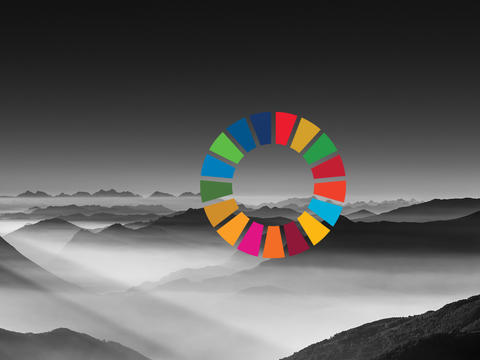Fundamental to responsible business conduct
Human rights are the basic rights that belong to every person no matter where they live, their nationality, colour, religion or other personal characteristics. Being part of a global industry employing more than 65 million people across the world, we have a responsibility to respect human rights and ensure that people are treated with dignity.

International human rights standards & principles
Our commitment
Our ambition is to embed and advance respect for human rights throughout our business, operations and supply chain, in relation to activities under our full, direct control.
As a signatory to the United Nations Global Compact since 2003, we are committed to upholding international human rights standards and principles, including:
- the International Bill of Human Rights (comprising the Universal Declaration of Human Rights, the International Covenant on Civil and Political Rights, and the International Covenant on Economic, Social and Cultural Rights)
- the International Labour Organization’s (ILO) Declaration on Fundamental Principles and Rights at Work, and its eight Core Labour Standards
In doing so, we aim to implement policies and processes that respect applicable law in the countries in which we operate and take into account the United Nations Guiding Principles for Business and Human Rights (UNGPs), and the Organisation for Economic Cooperation and Development (OECD) Guidelines for Multinational Enterprises.

Our Human Rights Policy Statement
Our Human Rights Policy Statement reflects our approach to respecting human rights. These commitments are being progressively embedded into our global organisation, including through the development of a directive supported by training and guidance, as well as a roadmap to drive our strategic action plan.
Key actions to support our human rights ambition are defined in our human rights roadmap which was developed following a human rights impact and gap analysis across our global business to more fully understand our potential human rights impacts.
This analysis, conducted with the help of specialist third-party human rights consultants, considered current and upcoming regulatory requirements and international best practices as well as international human rights principles and standards.
Assessing human rights risks
Our commitment
Our salient human rights issues were identified (see box below) through an assessment of impacts based on severity (scope, scale, irremediability), likelihood, relationship and level influence to inform prioritisation. They were verified through dialogue with both internal and external stakeholders.
Taking into account that salient issues may change over time, we are committed to reviewing them on a regular basis.

Risks related to the salient issues are recorded in the Enterprise Risk Management system and governance follows a similar process as the one existing for the Top Company Risks. Each risk has an owner and an action plan which is reviewed regularly, including by senior management.
Our approach to Artificial Intelligence (AI)
Guided by a trustworthy AI agenda, we prioritise an ethics by design approach to AI, integrating respect for human rights and adherence to International Humanitarian Law (IHL), through the principles listed below
- Safety first - Safety is our top priority, at the heart of everything we do. We ensure the highest standards of reliability and dependability to protect lives and property.
- Wellbeing and sustainability - The AI systems we use should enhance societal wellbeing, expand our business, and promote a safe, united world. They also contribute to our sustainability goals by respecting the planet, valuing people and enabling prosperity.
- Human agency and oversight - Human oversight of AI systems is essential. It includes the ability to understand, supervise, and control their design and operation, as well as the capacity to detect deviations from intended behaviour and override AI decisions when necessary. Airbus AI systems respect individuals' rights to independent thought, decision-making, and action.
- Accountability and transparency - As stakeholders, providers, and deployers of AI systems, Airbus takes responsibility for their function and consequences. We achieve this by designing transparent and explainable systems.
- Fairness - We believe in equal rights, opportunities, and fairness for all, without discrimination, and we support diversity and inclusion.
- Data Privacy and Governance - Airbus adheres to strict data privacy and governance standards.
Our approach to modern slavery
Modern slavery is a significant global issue that can affect every country, sector and industry. It can take many forms, such as human trafficking, forced and bonded labour and child labour. According to the Global Slavery Index, an estimated 40.3 million slaves exist in the world today. This includes approximately 10 million children.
Since 2017, we have published a Modern Slavery Statement every year. This Statement sets out the steps we are taking to mitigate the risk of modern slavery in our business and supply chain including our subsidiaries and affiliates. It also includes the fundamental principles that govern the way we approach preventing modern slavery now and in the future.
Speaking up
We encourage anybody connected with our business activities to 'speak up' through various channels, including OpenLine. The OpenLine enables anybody who has a concern, including suppliers, to securely and confidentially submit an alert in good faith on potential issues, including those relating to bribery, human rights, environment, and health and safety.

Integrity & transparency throughout our supply chain
Because we outsource a significant part of our activities, our global supply chain is a fundamental part of our ecosystem. We believe the human rights of anyone who works for or with Airbus must be respected—regardless of their location anywhere in the world.
Today, we promote integrity and transparency through our supply chain due diligence process. The objective of this process is to:
- Identify social and environmental risks in our supplier base
- Facilitate supplier self-assessments that measure our suppliers’ ability to comply with all applicable laws, regulations and standards
- Conduct on-site assessments as required
Supplier Code of Conduct for all Airbus suppliers
Our Supplier Code of Conduct, based on the International Forum on Business Ethical Conduct (IFBEC) model, is the document of reference for our approach to responsible supplier management. The Code represents our group-wide values and principles in line with internationally recognised standards and conventions (such as OECD and ILO).
We expect our suppliers to comply with the key values set out in the Code. We also expect our suppliers to cascade these principles throughout their supply chains. In addition to the Code, our suppliers must comply with all applicable laws and regulations of the countries in which operations are managed and/or services provided. Regardless of where our suppliers are located, all business should be conducted in a manner compatible with the Code.
Some of the provisions in the Airbus Supplier Code of Conduct include the following topics:
- Compliance with laws
- Anti-bribery and corruption
- Anti-money laundering and tax evasion
- Data protection
- Fair competition
- Health and safety
- Respect for human rights, including prohibition of child labour and human trafficking
- Environmental protection
- Product safety
- Employment practices, including non-discrimination

Responsible mineral sourcing
To ensure the proper functioning of components within our products, the use of some minerals is necessary. These minerals include tantalum, tin, tungsten and gold, which are commonly used in electronic components.
Our approach to responsible mineral sourcing includes the following actions:
- We published a Responsible Mineral Policy, which details our engagement to improve safety and human rights conditions in the mineral supply chains.
- In 2019, we joined the Responsible Minerals Initiative, which aims to find cross-industry solutions to minimise social risks in mineral supply chains.


